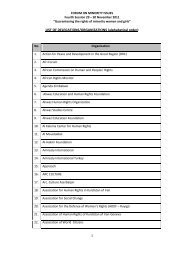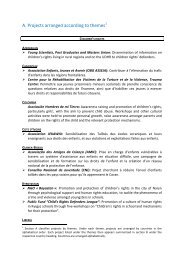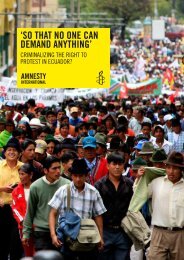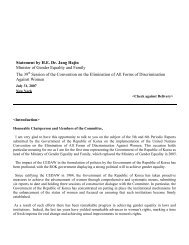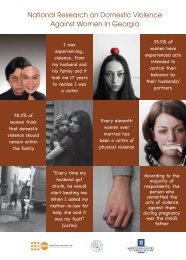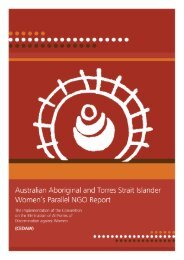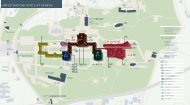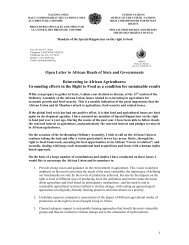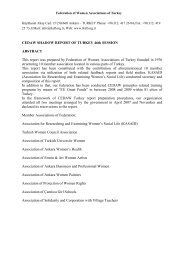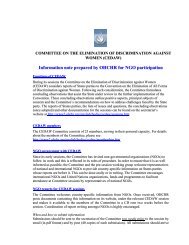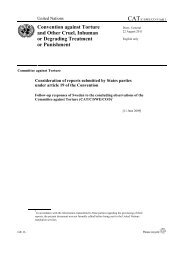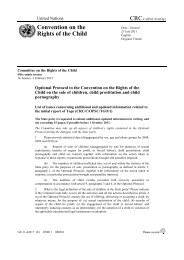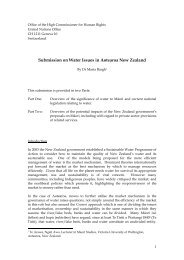Report - Office of the High Commissioner on Human Rights
Report - Office of the High Commissioner on Human Rights
Report - Office of the High Commissioner on Human Rights
- No tags were found...
You also want an ePaper? Increase the reach of your titles
YUMPU automatically turns print PDFs into web optimized ePapers that Google loves.
The current rapidly growing and overpopulated city, with a c<strong>on</strong>tinuing trend <str<strong>on</strong>g>of</str<strong>on</strong>g> urban migrati<strong>on</strong><br />
(compared to o<str<strong>on</strong>g>the</str<strong>on</strong>g>r island nati<strong>on</strong>s in <str<strong>on</strong>g>the</str<strong>on</strong>g> Pacific) has marginalised indigenous people in Port Moresby,<br />
whose land and resources have been overtaken because <str<strong>on</strong>g>of</str<strong>on</strong>g> <str<strong>on</strong>g>the</str<strong>on</strong>g> expanding populati<strong>on</strong> i.e. marine and<br />
hunting places have been removed for development. We have become spectators in our own land –<br />
unwanted because we are a minority in a populati<strong>on</strong> where migrating communities have become <str<strong>on</strong>g>the</str<strong>on</strong>g><br />
majority. The reducing clan lands have impacted <strong>on</strong> women who have married outsiders, because<br />
although <str<strong>on</strong>g>the</str<strong>on</strong>g>y have potential for bringing benefits into family, <str<strong>on</strong>g>the</str<strong>on</strong>g>y pose a threat to taking away already<br />
scarce clan land. Unless <str<strong>on</strong>g>the</str<strong>on</strong>g>re is scope for returning available unused alienated land, our women will<br />
c<strong>on</strong>tinue to compete with <str<strong>on</strong>g>the</str<strong>on</strong>g>ir clansmen for access to customary land where <str<strong>on</strong>g>the</str<strong>on</strong>g> demand is much higher<br />
than <str<strong>on</strong>g>the</str<strong>on</strong>g> land available.<br />
Under customary land ownership, land is communally owned by an “iduhu” or clan and not by any<br />
individual. Membership <str<strong>on</strong>g>of</str<strong>on</strong>g> a clan in principle is automatic by birthright. All clan members have rights<br />
to use <str<strong>on</strong>g>the</str<strong>on</strong>g> land and are expected to respect <str<strong>on</strong>g>the</str<strong>on</strong>g> rights <str<strong>on</strong>g>of</str<strong>on</strong>g> o<str<strong>on</strong>g>the</str<strong>on</strong>g>r clan members. The clan chief and <str<strong>on</strong>g>the</str<strong>on</strong>g><br />
elders c<strong>on</strong>sult in making decisi<strong>on</strong>s about <str<strong>on</strong>g>the</str<strong>on</strong>g> use <str<strong>on</strong>g>of</str<strong>on</strong>g> land.<br />
In <str<strong>on</strong>g>the</str<strong>on</strong>g> Motu-Koita traditi<strong>on</strong>, <str<strong>on</strong>g>the</str<strong>on</strong>g>re are two types <str<strong>on</strong>g>of</str<strong>on</strong>g> leaders and <str<strong>on</strong>g>the</str<strong>on</strong>g>se are:<br />
• Leadership earned through deeds <str<strong>on</strong>g>of</str<strong>on</strong>g> bravery, power or success, such as in hunting, gardening,<br />
fishing, witchcraft and sorcery;<br />
• Leadership inherited through <str<strong>on</strong>g>the</str<strong>on</strong>g> patrilineal system which makes <str<strong>on</strong>g>the</str<strong>on</strong>g> eldest living s<strong>on</strong> <str<strong>on</strong>g>the</str<strong>on</strong>g> land<br />
leader (i.e. “mato omoto” or “tano kwarana”). This role is <strong>on</strong>ly to c<strong>on</strong>trol use <str<strong>on</strong>g>of</str<strong>on</strong>g> <str<strong>on</strong>g>the</str<strong>on</strong>g> land, but not<br />
to own <str<strong>on</strong>g>the</str<strong>on</strong>g> land, as all land is communally owned by <str<strong>on</strong>g>the</str<strong>on</strong>g> clan.<br />
Unlike certain parts <str<strong>on</strong>g>of</str<strong>on</strong>g> PNG where land is c<strong>on</strong>trolled through matrilineal inheritance, <str<strong>on</strong>g>the</str<strong>on</strong>g> Motu-Koita<br />
women have strict limitati<strong>on</strong>s <strong>on</strong> <str<strong>on</strong>g>the</str<strong>on</strong>g>ir rights and access to land. A Motu-Koita woman marrying outside<br />
<str<strong>on</strong>g>the</str<strong>on</strong>g> clan relinquishes her membership <str<strong>on</strong>g>of</str<strong>on</strong>g> <str<strong>on</strong>g>the</str<strong>on</strong>g> clan, unless she decides to live with her family in her<br />
original clan where she retains membership <str<strong>on</strong>g>of</str<strong>on</strong>g> <str<strong>on</strong>g>the</str<strong>on</strong>g> clan <strong>on</strong> terms and c<strong>on</strong>diti<strong>on</strong>s determined by custom.<br />
A woman who has married an outsider but is living in <str<strong>on</strong>g>the</str<strong>on</strong>g> clan may plant useful trees (such as coc<strong>on</strong>uts,<br />
betel nuts, mangoes, breadfruit etc.) <strong>on</strong> land allocated for her use but her descendents cannot use it<br />
as evidence <str<strong>on</strong>g>of</str<strong>on</strong>g> ownership. The trees are planted <strong>on</strong> <str<strong>on</strong>g>the</str<strong>on</strong>g> basis <str<strong>on</strong>g>of</str<strong>on</strong>g> permissive occupancy and descendents<br />
<str<strong>on</strong>g>of</str<strong>on</strong>g> <str<strong>on</strong>g>the</str<strong>on</strong>g> woman have access until <str<strong>on</strong>g>the</str<strong>on</strong>g> trees reach <str<strong>on</strong>g>the</str<strong>on</strong>g> end <str<strong>on</strong>g>of</str<strong>on</strong>g> <str<strong>on</strong>g>the</str<strong>on</strong>g>ir useful lives.<br />
My <strong>on</strong>ly daughter is married to an outsider and has had to apply for a piece <str<strong>on</strong>g>of</str<strong>on</strong>g> land and build her<br />
house to become part <str<strong>on</strong>g>of</str<strong>on</strong>g> <str<strong>on</strong>g>the</str<strong>on</strong>g> clan. She is in <str<strong>on</strong>g>the</str<strong>on</strong>g> positi<strong>on</strong> where she cannot access <str<strong>on</strong>g>the</str<strong>on</strong>g> land unless she<br />
gets approval from <str<strong>on</strong>g>the</str<strong>on</strong>g> clan chiefs. Only <str<strong>on</strong>g>the</str<strong>on</strong>g> chiefs and community leaders can participate in such<br />
decisi<strong>on</strong>-making. But because she has married an outsider, and he is unemployed, her family has a<br />
lower status and is discriminated against.<br />
Sources - Internati<strong>on</strong>al human rights. Equal rights for women have been a goal for PNG but many women<br />
are not aware <str<strong>on</strong>g>of</str<strong>on</strong>g> <str<strong>on</strong>g>the</str<strong>on</strong>g> rights that are available to <str<strong>on</strong>g>the</str<strong>on</strong>g>m from <str<strong>on</strong>g>the</str<strong>on</strong>g> internati<strong>on</strong>al level. CEDAW – Art 1 n<strong>on</strong>discriminati<strong>on</strong>,<br />
gender equality; Art 14 (2) – rural women.<br />
Obstacles - Customary laws preventing her from accessing land; lack <str<strong>on</strong>g>of</str<strong>on</strong>g> access to court because she<br />
does not know her rights; <str<strong>on</strong>g>the</str<strong>on</strong>g> character <str<strong>on</strong>g>of</str<strong>on</strong>g> <str<strong>on</strong>g>the</str<strong>on</strong>g> husband may be an obstacle if it means <str<strong>on</strong>g>the</str<strong>on</strong>g> chief does<br />
not accept <str<strong>on</strong>g>the</str<strong>on</strong>g>ir applicati<strong>on</strong>; land not being available for women; land being held by <str<strong>on</strong>g>the</str<strong>on</strong>g> crown since<br />
col<strong>on</strong>ial times.<br />
160 WOMEN’S RIGHTS TO ADEQUATE HOUSEING AND LAND



